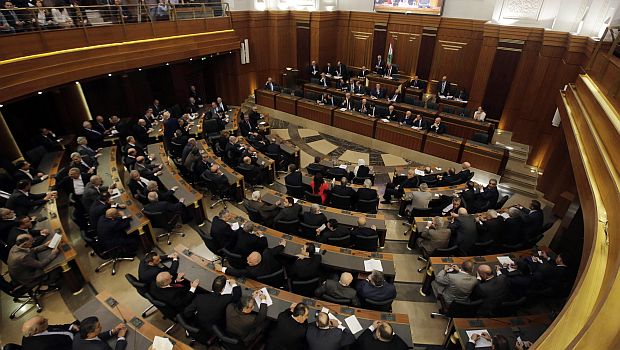
Lebanese members of parliament gather to elect a new president in downtown Beirut on Wednesday, April 23, 2014. (AP Photo/Joseph Eid, Pool)
The speaker of the Lebanese parliament, Nabih Berry, postponed the vote for president until July 2, after only 63 of 128 MPs turned up to the latest session, not enough to secure a quorum.
Under Lebanon’s complex political system, the president—elected by a secret ballot of MPs—is drawn from the country’s Maronite Christian community. However, Lebanese Christian parties are split over who should get the job, with the two leading candidates hailing from parties which are members of rival political coalitions.
The candidate of the March 14 Alliance—one of Lebanon’s two major political blocs—Samir Geagea, is opposed by members of the rival March 8 Alliance.
March 8 backs Michel Aoun of the Free Patriotic Movement, though he has so far refused to officially declare himself a candidate until he has won sufficient support on all sides of the Lebanese political scene to guarantee victory.
Aoun’s followers and members of Hezbollah, another March 8 member, have boycotted previous parliamentary sessions, preventing the body from securing the necessary two-thirds quorum.
Speaking before Wednesday’s session, a Hezbollah parliamentary source told Asharq Al-Awsat that the party would continue its boycott until a consensus candidate had emerged.
Speaking on the condition of anonymity, the source said: “The process of guaranteeing the quorum without prior agreement on the name of the president is not up for discussion.”
Meanwhile, the head of the Progressive Socialist Party, Druze leader Walid Jumblatt, traveled to Paris on Tuesday to meet with Saad Al-Hariri, the leader of the Sunni Muslim Future Movement and head of the March 14 Alliance.
Speaking before his departure, Jumblatt said he would inform Hariri that his followers would not support either Aoun or Geagea. Jumblatt has instead nominated one of his followers in parliament, Henry Helou, for the presidency.
Speaking about the meetings this week between Jumblatt and Hariri, Helou said: “Jumblatt will reiterate his position to Hariri regarding his opposition to the nominations of Aoun and Geagea, and will no doubt indicate his support for my nomination, or that of any centrist figure with the same qualities.”
In a statement to Asharq Al-Awsat, Helou said he hoped the worsening events in the region, especially in Iraq, would be sufficient incentive for political leaders in Lebanon to move towards breaking the deadlock, because of “fears of the spread of the crisis to Lebanon if the internal issue remains as it is.”
The term of Lebanon’s previous president, Michel Suleiman, expired at the end of May, amid mounting fears of a vacuum at the top of Lebanese politics.
A Future Movement MP, Mohammad Al-Hajjar, backed Hariri’s call for Helou to convince Christians in March 14 that he was a viable consensus candidate, as well as his announcement that he would not veto any nomination.
However, he blamed Hezbollah for disrupting the process, saying the Shi’ite movement was “ignoring all principles of democracy” by continuing its boycott of the voting process.
Speaking to Asharq Al-Awsat, Hajjar asked: “Why has Hezbollah failed to nominate Aoun so far? And why do they keep throwing the ball in the Future Movement’s court?”
Hajjar said the Future Movement—while standing by Geagea—would be prepared to discuss “alternative solutions to take Lebanon out of the crisis by adopting other nominations, on condition that Hezbollah abandons the logic of force and threats, which they use to impose the president they want.”
